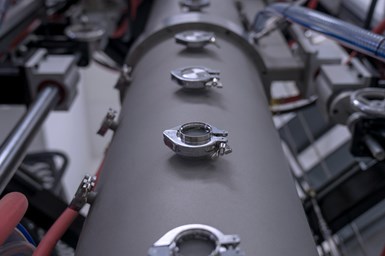6K Additive Partners With Incodema3D for Powder Supply, Recycling
6K Additive says its nickel alloy 625 powder surpassed every quality measure in tests performed by Incodema3D.
6K Additive, division of 6K, has formed a strategic additive manufacturing (AM) powder supply agreement and recycling partnership with Incodema3D. 6K Additive is a division of 6K and a provider of sustainable production of engineered materials for AM and lithium-ion batteries produced using its UniMelt plasma technology.
Following increased demand and larger volume orders (predominantly from aerospace and defense customers), Incodema3D sought to secure a domestic AM metals powder supply that meets strict quality standards and a solution for recycling its used powder and parts. 6K Additive, through its UniMelt plasma microwave powder production system, is able to provide high volumes of domestically manufactured powder and a route to sustainably recycle Incodema3D’s used metals through its Powder Buy Back program.
“We are talking to clients now about projects for 2023 that will require 10 tons of metal powder per month. When you’re going through that volume of powder, recycling becomes imperative and sustainability is key to our business,” says Kevin Engel, Incodema3D director of additive manufacturing and metrology operations. “By recycling our used powder with 6K Additive, we have been able to drive down our contribution costs for material by 15% already. Add to it the quality standards both Incodema3D and our customers demand sets a high bar for any one supplier. 6K Additive overachieved on this front.”
6K Additive says its mission is to provide a solution for global decarbonization in producing performance AM materials which are critical to production in markets such as aerospace, medical and industrial applications. The company recently released results from an LCA study conducted by Foresight Management comparing the environmental impact of 6K’s UniMelt microwave plasma technology to current atomization technologies to produce metal powders. The results showed a 91% reduction in energy use and a 91.5% reduction in carbon emissions when using the 6K UniMelt process.
Incodema3D undertook its own prequalification of 6K Additive’s nickel alloy 625 (Ni625), which is a high-strength and corrosion-resistant alloy. Internal qualification samples measured tensile strength, microstructure, density and chemical composition. The company benchmarked the results against existing suppliers and its strategic customer’s requirements.
6K Additive’s Ni625 surpassed every measure used in the assessment, including tensile strength (greater than 125 ksi), yield strength (greater than 85 ksi) and elongation at break (greater than 30%). “We tested five samples and each one returned density results of 99.9%, which far exceeds the minimum requirement,” Engel says. “Anything over 99.5% density in additive manufacturing is a good part.”
Securing a scalable, domestic materials supplier was also important to Incodema3D. As 6K Additive upcycles used and waste material from domestic sources, it is not at risk of supply chain disruptions, the company says. For defense customers, a shorter domestic supply chain is also preferable from a security and traceability standpoint.
Related Content
-
Concept Sneaker Boasts One-Piece 3D Printed TPU Construction
The Reebok x Botter Concept Sneaker Engineered by HP premiered at Paris Fashion Week, hinting at manufacturing possibilities for the future of footwear.
-
How 3D Printing Aids Sustainability for Semiconductor Equipment: The Cool Parts Show Bonus
Hittech worked with its customer to replace fully machined semiconductor trays with trays made via DED by Norsk Titanium. The result is dramatic savings in tool consumption and material waste.
-
Video: AM for Repair of Large Shafts
Wind power shafts that might once have been scrapped are now returned to service. See the robotic directed energy deposition (DED) and shaft preheating system developed by Ikergune, Izadi and Talens.















